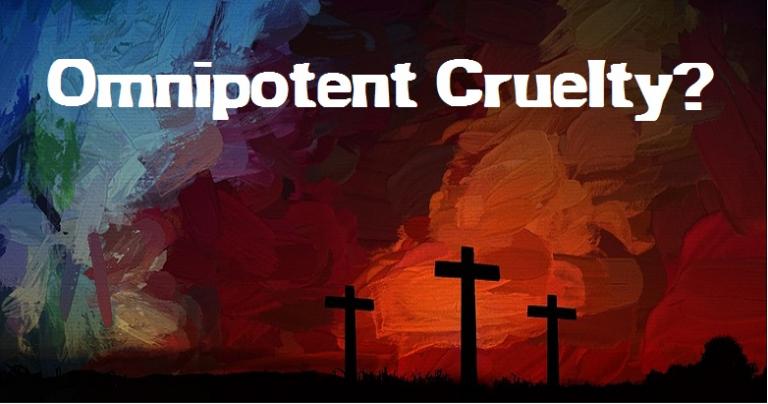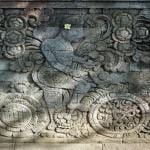
Sadly, the gospel of cruel, coercive force continues to be far more successful and widespread than the Gospel of Jesus.
It is a cruel thing that Americans lack connections in understanding our origins. For instance, the word “metropolis” might bring Superman to mind for many us. Metropolis has Greek roots, the terms for mother (mater) and ancient Mediterranean city-state, (polis). In the days of prepaschal Jesus, the polis was the center of administration and residence for Mediterranean “supermen,” the elites. Great power—cruel, coercive force—came with the polis and its masters. Its symbols were known and felt within and throughout the agrarian surround.
All eyes looked to the polis, from where the word politics is derived, as is police. The polis, in its institutions and symbols, reified the cruel, coercive force. The emperor personified the power of the polis, since he was seen as the highest of men, and lowest of gods.
What God Do You Worship?
Scholar Bruce Malina taught us that when it comes to worship, it was irrelevant what domain of reality belonged to a particular Mediterranean god. What mattered was power. The god could rule over underworld, sea, land, harvest, time, or sky vault, but it didn’t matter. Regardless of the domain associated with the deity, the only god worth worshiping was an omnipotent god, a god of supreme cruel, coercive force.
That is one way of looking at omnipotens Deus—not the only way, as we’ll hopefully see!—but sadly, the most common through the Christian ages. Many to this day continue to worship this god of cruel, coercive force. Because with such a god, you can say all the Jesusy things you’d like to, meanwhile delighting in the most cruel and heartless behavior. You can belong to “the saved” and “the righteous,” all the while maintaining racsist, classist, and narcissistic paradigms.
We can profess and confess with our mouths how much we adore Father, Son and Spirit—but really just belong enslaved to the idol of coercive force and the violence of rape.
Cruel Constantinian Synthesis
While it is true that the Body of Christ exists from the first century until now, it wasn’t until around 325 CE at the summer residence of Emperor Constantine that “Christianity” was formalized. As brilliant scholars like John Elliott have shown us, don’t call anything Christian before the fourth century.
It should not be shocking to anyone, then, that nascent Christianity was, at first, the imperial political religion of Constantine. Neither should it surprise anyone that the political religion of this one-world emperor believed in “one God, the Father ALMIGHTY.” We must distinguish Constantinian Christianity from prophetic Christianity, and God works in the messiness, folks.
As Medieval theologians like St. Thomas Aquinas held, all God-talk is analogy; all analogy is rooted in human experience. To this, the social scientists add: All human experience is culturally specific. Ask yourself: what would be a culturally plausible way for a fourth century Roman to understand and speak about “God”? What would be his reckoning of “omnipotens”?
A Cruel God is the Culturally-Plausible Explanation
As Malina and colleagues explain, from its very beginning, the polis was focused on the value of cruel, coercive force. As we have seen in the parable of the Two Lost Sons, throughout the Mediterranean world, the urban elites dominated, exploited, and crushed the peasantry surrounding them. Polis and the cult of cruel Omnipotens are inseparable since Cain who was enshrined in the sacred myths of Genesis as father of villages and murder.
Truly sons of Cain, the supermen-elites of the Mediterranean polis valued cruelty and employed it effectively. Nowhere was this more true than with Rome. This polis wielded cruelty terrifyingly over weaker city-states, but especially over non-elites, outgroups, and all those with lower status, to humans and nonhumans alike. In this, the American Empire shows its genetic heritage with the mater-polis Rome.
Defining Cruel
According to Malina and friends, “cruelty may be thought of as any process of maiming the ordinary patterns of behavior which are some living creature’s way of living.” So if you maim your victim, this person now becomes passive, his or her resistance will be crippled.
We see this pattern from the earliest Christian legends. Monstrous Grendel is the issue of wicked Cain, first of all outgroups, outcasts, vagabonds, and the father to demons. Happily, Beowulf smashes him.
The Christian Anglo-Saxon poem Beowulf celebrates a koinonia of cruelty shared between Omnipotens and the Christian hero. Every great Christian hero eats the bread and drinks from the cup of Cruel Omnipotens—Beowulf, King Arthur, on down the line. To the Christian hero, Omnipotens rewards with the feast of the life of the victim, whole and entire. Without concern for the victim’s well-being, the worshiper of the god of the polis is the holy victimizer. In him, cruelty is socialized as being holy.
https://www.youtube.com/watch?v=onYwsgDHqtI&fbclid=IwAR0_3PEjea_bfVAAUUGdABPgmxFIyOb7lvxkcaScnTT-AgyBRGtjcm6e150
Along with Cesare Borgia, one could also bring up “Defenders of the Cross” like Vlad III Dracula, whose favorite method of execution earned him the nickname “Impaler.” Some Christians have no problem calling this cruel murderer of the poor (and anyone else who got in his way) a saint. But that shouldn’t be shocking, really, if you think about it. Christians have been historically comfortably numb about a lot of atrocities meted out in the Holy Name of God.
https://www.youtube.com/watch?v=3-N2-opoPUM
I Believe in Being Cruel
Imagine a daily communicant, or several, in bitter anger about migrants coming to the United States on rafts. So this Extraordinary Minister of Communion opines with his fellow members of a parish council, “We should have mechanized gun turrets on the beach to greet them!” Think that is ludicrous? Do you believe that we don’t have such people in our parishes that would dare think such horrors, much less say them? Think again.
“I believe in God, the Father Almighty.” Okay. But what does that mean? Culture shapes and limits how I understand that line. Maybe if I don’t critically reflect on it, it can mutate into a vehicle to the worst demons of our society. Therefore it can cloak a kind of Crack House where addiction to cruelty worsens. The false god Omnipotens helps cruelty go unchecked, unhindered, unchanged in complacency. In my daily life, love and compassion are hollow words to the superior reality lived of coercive force.
It doesn’t matter how many times I speak about love, kindness, decency, or “family values.” Everything in my life adores Omnipotens, and proves coercive force is superior to all these other “feels.” We can all use holy words and holy speak, but mean radically different things by them! There are moral limits to verbal orthodoxy.
Cruel Belief
Wisely Father Richard Rohr says, “Your image of God creates you.” How true that is! And Dr. Cornel West may add that, “The crisis of vision is real.”
Revenge and grievance are sanctified by “holy” Omnipotens. So too is any cruelty, whether epic or the subtle sort clothed by “nice” Americans or Germans. The checks of anxiety, whether via shame or psychological guilt, are cast, bound and muzzled, into dungeons far removed from my awareness. My adoration for this idol keeps me from being depressed. The holy delusions of Omnipotens safeguards me from ever understanding and identifying with the marginalized.
There is no real empathy with Omnipotens, cruel god of the polis and Empire, patron of the nails driven into the feet and hands of Jesus whom I claim to love without ever even trying to know. There is no walking in the other’s shoes, no soul-to-soul gemeinschaft-relations. It’s ultimately despair because it offers all dogmas but nothing dynamic, and therefore no possibility but this futility and misery. Such beliefs comfort in the seemingly pleasant air of life’s prime, but it’s a nightmare when you hit hospice, Superman!
But we don’t have to think about that unpleasantness when we’ve got uncanny Omnipotens. He truly is the god of the impossible-made-possible. He can make wars “just.” Warfare can even be made holy, and the brutalizing of peoples the will of God. If you wish to obliviate anything redeeming in your enemies and justify being cruel, hold fast to Omnipotens, true believer!
Being Cruel throughout the Ages
Reading some historical treatments help us Americans to see that we are not too far from our Roman ancestors in beliefs and practices. Works like David Stannard’s American Holocaust: Columbus and the Conquest of the New World (1992) and James Bacque’s Other Losses: An Investigation into the Mass Deaths of German Prisoners at the Hands of French and Americans after World War II (1989), help.
Good reading showcases the enduring cult of Omnipotens throughout history in Roland Auguet’s Cruelty and Civilization: The Roman Games (1972). This also is seen in Keith Hopkins’ Death and Renewal: Sociological Studies in Roman History (1983).
Not only in Rome, but elites from all over the Mediterranean world saw cruel Omnipotens as being far superior to compassion and forgiveness. Don’t be naive, fellow Christians: the Bible does not escape this. Consider the books of Deuteronomy, the genocidal warfare of Joshua, and the bloodthirsty glee of Nahum, where we find biblical examples of the cult of Omnipotens!
Considering the Creed of Constantine, all 21st century Christians must ask: WHAT IS THE CONTEXT of “omnipotens Deus”? How would Constantine understand the phrase, “I believe in one God, the Father, the Almighty”?
In our Christian Bibles—together with the Torah and Quran—could there be some hangover of the worship of Omnipotens going on? If so, inspiration must be a messy business my friends! If so, how can ANY of these sacred texts be the final word on things? Shouldn’t Christians critically reflect about the very important difference between a first word and the final word about stuff?
What Being Cruel Says
Imagine a society that uses cruel, coercive force as a means of entertainment. What does that say about the social system therein? Consider Nazis—and many Christian European peoples over the past two millennia!—who abused, persecuted, tortured and murdered Jews. What does this say about them and their god?
Consider Serbians torturing Bosnian Moslems, or Israelis abusing Palestinians. Or, consider Hutus slaughtering Tutsis in Rwanda and Tutsis slaughtering Hutus in Burundi, all of them Christians! And consider also the defenseless Twa abused by both, and hardly ever mentioned.
What does the cruelty of Christian European pilgrims say when they abused indigenous peoples all in the name of Christ? What does it say about the faith of Americans instructing torture techniques to South Americans, and even providing their elites with weapons of assassination, like the gun used to murder St. Óscar Romero celebrating Mass?
Looking at all that, together with Christian U.S. presidents suggesting moats full of deadly reptiles for migrants along with shooting them in their legs, what do you think? Isn’t it apparent that belief in Omnipotens is far more successful, widespread, and effective than Jesus’ Good News? You’d have to be delusional not to see this. You should know that fundamentalism of all stripes is a psychological problem.
Holy and Cruel and Same
Examine how every ancient Mediterranean polis, like Rome, justified cruelty and declared the brutalizing of peoples holy work. This is just like contemporary Mediterraneans, whether they be Serbians, Algerians, Israelis, Saudis, whatever. They worship Omnipotens fiercely and justify cruelty.
And what about you and your friends? Don’t believe your fellow dying inmates when they talk about love and sweetness all the time. Be skeptical and look around you! Does what we are going through right now in our society and world look like love and Jesus? What kind of love and Jesus is this?
Americans strongly worship Omnipotens, folks. We are experts at cruelty. So too are the Russians and Chinese. This is most especially true of the elites.
Drunk with hero-worship, it’s not easy to see this, but we must in order to wake up. Otherwise we keep on dreaming.
Waking Up from Cruel Dreams
A brief aside, I am a geek for TWIN PEAKS, the groundbreaking television artistic achievement from author Mark Frost and auteur David Lynch. That’s probably an understatement. To my judgment, it simply is the best thing on television in over a quarter century. Imagine my delight this week as news and rumors exploded over the interwebs of a possible continuation coming at us soon!
Dreams play a major role in TWIN PEAKS. Back in 2015, two years before TWIN PEAKS THE RETURN aired on Showtime, interviewer David Stratton asked David Lynch:
“There’s a line in TWIN PEAKS FIRE WALK WITH ME: ‘We live inside a dream. That’s a very Lynchian–”
“No,” interrupted Lynch, “that’s sort of the TRUTH.”
This was met with chuckles. Then Lynch continued, “It’s sort of the truth. And one day we wake up and we realize that it was a dream… and we realize who we truly are. It’s a glorious day when that happens!”
TWIN PEAKS is about many things, such as events of great cruelty coming to light. Often people start out watching PEAKS thinking that it’s about the cool FBI white male savior or the spoiled rich princess whose palms itch for adventure. However, many eventually become disappointed when they realize that it never was about their stories, not really. It’s mainly about an abuse victim who happens to be the unlikely center of the universe.
In this regard, watching TWIN PEAKS is kind of like U.S. Christianity. It’s like being inside a dream. We think life is all about something other that what it really is about. Hopefully somewhere along the way we wake up, drink some damn good coffee, and smell the Douglas Firs, and become aware. Hopefully we realize we have a lot of crazy ideas about God, holiness, life, insiders, outsiders, and Jesus, the Galilean day laborer. Hopefully we awaken.
Waking Up about Jesus
Considering Jesus, he demands his followers cancel debts and reconcile. He holds fast to the Israelite double-command of sticking like glue onto God and neighbor. Weigh that against worshiping the god Omnipotens in these cruel American times.
How do you imagine God? Is he cruel? Is he a great coercive force of unstoppable power, a juggernaut who gets whatever he wants, whenever he wants it?
How do you imagine Christ? Prior to his death and resurrection, do you imagine that if he wanted to, with but a thought, he could have evaporated the Pacific Ocean? Do you think that he could have disintegrated Pilate and his guard and the Sanhedrin with his mind? Are we doing Christology here, or comic books?
Consider your prayer life and what prayer means to you. Is it like Aladdin rubbing the lamp? Think about how you and your prayer relate to “the wrong people.”
What kind of omnipotent God is revealed by the crucified barbarian Israelite and peasant artisan Jesus?
Word of Hope
Catholic Christians believe that the Holy Spirit guides the Church and inspires the Scriptures. Does that mean that the Spirit coerces the Church and dictates the Bible? Does God force and manhandle the Magisterium (or Shepherding Authority) of the Church? Did God override the freedom, creativity, and intelligence of the human authors of Scripture, possessing them like a demon from a horror movie, as they were writing their sacred texts?
Where does it say that the Church is static—identical today, yesterday, and forever? Doesn’t awareness grow in the Church throughout our history, such as recognizing new things about inclusivity at the Table of God’s love? Are we not still continuing to grow in this regard? Do we not still have so much further to grow?
Let’s not drop that word “Almighty” from our Profession of Faith. But let’s forever subject our beliefs and ways of looking at things to the fires of metanoia. What becomes of Omnipotens when we see the Crucified, the Image of the Unseen Father (Colossians 1:15; John 12:45; 14:9)? How is “Almighty” transformed?












